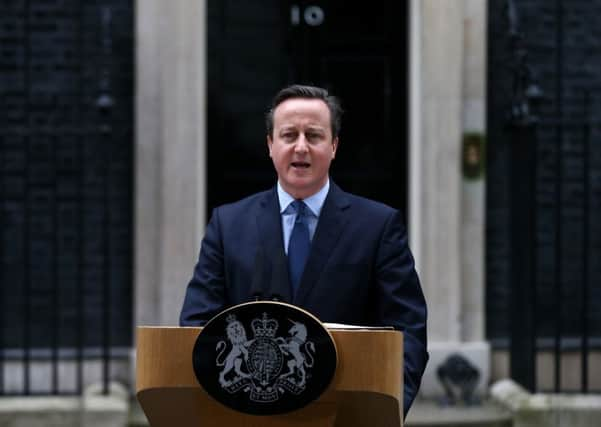Don't put UK at risk in June EU referendum - David Cameron


The Prime Minister returned from his marathon negotiations in Brussels to brief a rare Saturday meeting of the cabinet on his reform package and to confirm the date of his promised in/out referendum.
The meeting was the signal for five cabinet ministers headed by Justice Secretary Michael Gove – freed from the shackles of collective responsibility – to declare they would campaign for an “out” vote.
Advertisement
Hide AdAdvertisement
Hide AdLast night Nicola Sturgeon warned against “scaremongering and fear” tactics which were employed during the Scottish independence campaign as she said that she would add her voice to the “in” campaign.
The First Minister also indicated she would accept the June poll, despite it falling just seven weeks after the Holyrood election in May.
After yesterday’s cabinet meeting the Brexit supporters – plus Employment Minister Priti Patel, who is not a full cabinet member but attends meetings – headed out from Downing Street to the Vote Leave campaign headquarters, where they posed for photographers with a “Let’s take back control” poster.
In No 10, there was relief there were no last-minute surprises among the list of “outers” – which also included Work and Pensions Secretary Iain Duncan Smith, the Leader of the Commons Chris Grayling, the Culture Secretary John Whittingdale and the Northern Ireland Secretary Theresa Villiers.
During a meeting which lasted more than two hours – with every minister present being given the opportunity to speak – potential waverers such as Business Secretary Sajid Javid, Attorney General Jeremy Wright and deputy Conservative chairman Rob Halfon confirmed they would be in the “in” camp.
A Downing Street spokesman said the discussion had been conducted in “a good spirit and a dignified manner” with “measured, thought through interventions” from ministers reflecting the way they had each carefully weighed up the choice they were facing.
The meeting left “out” supporters looking to Boris Johnson – who so far has assiduously kept his options open – as the possible high-profile champion that their campaign clearly craves.
There was speculation that the London mayor could use a television appearance on today’s Andrew Marr show to finally come off the fence and declare his hand.
Advertisement
Hide AdAdvertisement
Hide AdSpeaking on the steps of No 10, Cameron said that the “special status” that he had secured for the UK meant the country could enjoy the benefits of the EU in terms of trade and security without having to sign up to a European superstate.
He said Britain inside the EU would be “safer, stronger and better off” while leaving would threaten the country’s “economic and national security” creating deep uncertainty for the future.
“Those who want to leave Europe cannot tell you if British businesses would be able to access Europe’s free trade single market, or if working people’s jobs are safe, or how much prices would rise.
“All they’re offering is a risk at a time of uncertainty – a leap in the dark,” he said.
Gove, who is one of the Prime Minister’s closest political allies, said that it had been “the most difficult decision of my political life” to disagree with Cameron, but that he had to remain true to his principles.
“My instinct is to support him through good times and bad. But I cannot duck the choice which the Prime Minister has given every one of us,” he said.
“I believe our country would be freer, fairer and better off outside the EU. And if, at this moment of decision, I didn’t say what I believe I would not be true to my convictions or my country.”
Polls have also consistently shown that Scotland is more in favour of remaining in the EU than the rest of the UK, and a vote to leave against the majority will of the Scottish people has been suggested as a possible trigger for another independence referendum.
Advertisement
Hide AdAdvertisement
Hide AdSturgeon insisted it was better “in all circumstances” for Scotland to stay in the EU.
She added: “We made it clear to the Prime Minister that we were opposed to a 23 June referendum, given the overlap with our own Scottish election, but now that that date has been named we will get on with the job of campaigning for an ‘in’ vote.
“It’s important that the campaign to remain in the EU learns the lessons of Scotland’s independence referendum, so that it does not lapse into scaremongering and fear.
“That is why the SNP will be a leading voice in the weeks and months ahead in making the positive case for Scotland and the rest of the UK remaining in Europe.”
Labour leader Jeremy Corbyn confirmed the Opposition would campaign for an “in” vote.
“We will be campaigning to keep Britain in Europe in the coming referendum, regardless of David Cameron’s tinkering, because it brings investment, jobs and protection for British workers.”
Ukip leader Nigel Farage dismissed the “truly pathetic deal” and urged voters to seize the “golden opportunity” to show Britain would be better off independent of Brussels.
Bookmaker William Hill said the odds indicated Brits would vote to stay in the EU. Odds were 2/7 for Britain to remain and 5/2 to leave.
